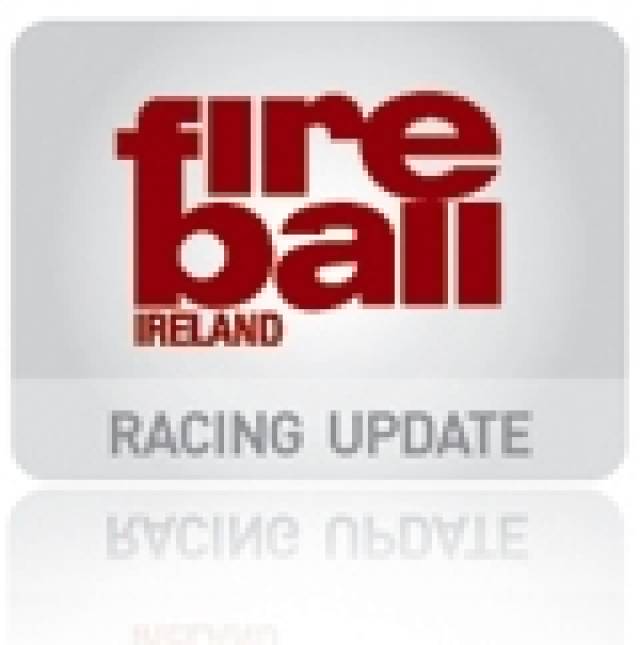#dbsc – With one boat in for repairs and another absent due to its skipper being on holiday, the Dublin Bay Fireball turnout was down in numbers – only three boats made the start line for the three lap triangle-sausage-triangle course in what was the first wet Tuesday night we have had for a while writes Cormac Bradley. This correspondent was not on the water, but he did watch proceedings for this report.
The southerly breeze which XCWeather was predicting for 19:00 was in place and the predicted wind strength of 9 knots, gusting 14 knots was about right in terms of the base wind strength but was a bit generous in terms of the gusts. All three boats appeared to favour a starboard tack start to sail parallel to the shore initially before tacking onto port for a long hitch inshore to the weather mark which was laid inshore for the southerlies. Up the first beat the three boats were in close company, though at the post-mortem afterwards the suggestion was that Messrs Butler and Colin had "fun and games" on the start-line.
All three rounded in quick succession and a fast spinnaker hoist by Noel Butler & Stephen Oram (15061) saw them quickly pull away from the other two with Oram full out on trapeze. Neil Colin & Margaret Casey (14775) appeared to sail a more windward line to the gybe mark and the additional breeze allowed them to sail over Louise McKenna & Hermine O'Keeffe (14691), fresh from collecting trophies (First lady helm and crew respectively) at the Europeans in Shetland. The wind appeared to fade as these two approached the gybe mark and all three seemed to have a tight three-sailer on the bottom reach to a leeward mark that was located just off the East Pier.
Butler & Oram were comfortable ahead at this stage and proceeded to sail their own course on the next beat, initially sailing inshore on port tack until the other two rounded – with Colin & Casey taking at the leeward mark and McKenna & O'Keeffe adopting the same policy as the leaders. Once Colin showed his hand, Butler went the same way! The wind was already starting to ease so the trapezing of the first beat was replaced with the marginal variety. While Colin appeared to have distance on McKenna at the leeward mark, by the time they each cleared the committee boat on separate approaches, the distance between them had dropped significantly.
At the 2nd weather mark, Butler & Oram gybed immediately whereas the other two sailed around to go out to the seaward side of the course on starboard. This prompted Butler to gybe away from the shore and shepherd the other two from a very safe distance. Sailing a more windward course again, Colin loses out to McKenna who sails past him but doesn't match his gybe allowing Colin to regain 2nd spot. At the leeward mark they are separated by a boat-length, with Colin ahead and inside boat.
On the final beat, Butler & Oram crossed the course on starboard tack, awaiting the rounding by the other two. They adopted the same approach, but it is now "nip and tuck" between them and at the final weather mark, McKenna has got ahead again. The 1-2-3 remained as was for the remainder of the race with Butler & Oram having a 1:30 minute advantage at the last leeward mark and McKenna & O'Keeffe having 30 seconds on Colin and Casey.
DBSC Tuesday Nights: Series 3, Race 2.
1 Noel Butler & Stephen Oram 15061 NYC
2 Louise McKenna & Hermine O'Keeffe 14691 RStGYC
3 Neil Colin & Margaret Casey 14775 DMYC
DBSC Tuesday Nights: Series 3 Overall (2 races) Pts.
1 Noel Butler & Stephen Oram 15061 NYC 2
2 Louise McKenna & Hermine O'Keeffe 14691 RStGYC 8
3 Neil Colin & Margaret Casey 14775 DMYC 9
Note that Series 2 was a three way tie between Butler, O'Keefe and Colin, each having 11 points after discard.
































































